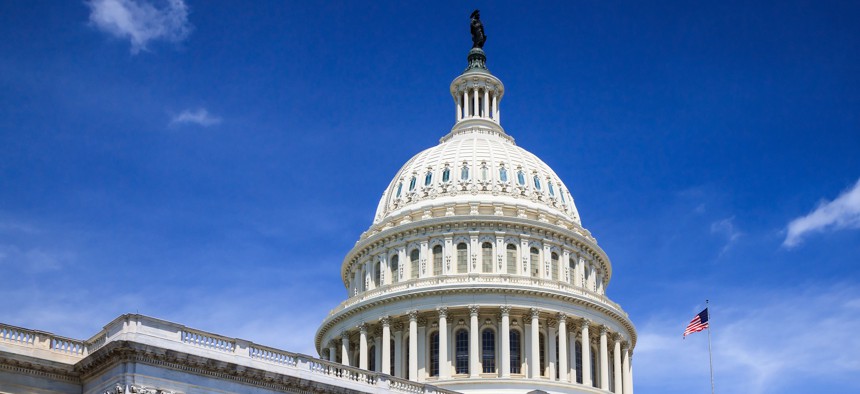Senate Panel Advances Bill That Would Boost TIGER, Maintain CDBG Funding

The United States Capitol building in Washington, DC in summer, blue sky. Shutterstock.com/ ZRyzner
U.S. Sen. Susan Collins was caught on a hot mic at a mark-up hearing for the legislation making some blunt comments.
WASHINGTON — Funding for transportation and community development grant programs, which mayors and other local leaders have characterized as crucial for their communities, would be largely preserved at current levels in a bill U.S. Senate appropriators advanced on Tuesday.
A Senate Appropriations subcommittee that oversees transportation, housing and urban development passed their fiscal year 2018 bill by a voice vote. The legislation includes roughly $60 billion in discretionary spending, about $2.4 billion above levels in the current fiscal year.
Not in the bill are many of the deep cuts the Trump administration included in a budget plan it sent to Congress earlier this year.
In an unexpected episode following the otherwise routine hearing on Tuesday, U.S. Sen. Susan Collins, the Maine Republican who chairs the subcommittee, was heard on a live microphone making some unvarnished remarks about the budget process and other topics.
“I swear OMB just went through and whenever there was ‘grant,’ they just X it out, with no measurement, no thinking about it, no metrics, no nothing,” Collins said, referring to the White House Office of Management and Budget. “I mean, it’s just incredibly irresponsible.”
Collins was believed to be speaking to the subcommittee’s top Democrat, U.S. Sen. Jack Reed of Rhode Island.
“If we don’t get a budget deal, we’re going to be paralyzed,” Reed said.
“I know,” Collins replied.
The Senate legislation includes $550 million for Transportation Investment Generating Economic Recovery, or TIGER, grants, which Congress allocated $500 million in fiscal 2017. The grants have funded road and transit projects in urban and rural areas across the U.S.
President Trump’s budget proposes eliminating all funding for the program.
And House appropriators passed a bill earlier this month that would zero-out funding for it. But, in recent years, a similar dynamic has unfolded, where House lawmakers seek to slash TIGER funding and the Senate provides money for the program.
The Senate bill would also provide $3 billion for the Community Development Block Grant, or CDBG, program and $950 million for the HOME Investment Partnerships initiative, which provides states and localities with grants meant to support affordable housing.
Those amounts are in line with fiscal 2017 enacted levels for the two grant programs.
In the House appropriations bill, the CDBG program is allotted $2.9 billion and HOME $850 million.
“I think virtually every member who put in requests asked that the CDBG program be maintained,” Collins said.
CDBG funds provide a flexible source of funding for local governments to help cover costs ranging from improving parks and sewer systems, to assisting the elderly and the homeless.
The U.S. Conference of Mayors is advocating for $3.3 billion for the CDBG program.
Trump’s budget proposes eliminating all funding for CDBG and HOME. Local officials have decried these and other sweeping cuts to domestic spending in the White House plan. The president is also pressing for a $54 billion increase in defense spending.
Funding for the Federal Transit Administration in the subcommittee’s bill checks in around $12 billion, about $285 million below 2017.
The legislation provides about $2 billion for transit project grants through the so-called New Starts program, according to a summary of the bill. Collins said the New Starts funding would be enough for all existing projects, as well as those New Starts projects covered by grant agreements that are expected to be signed in fiscal 2018.
The full Senate Appropriations Committee has a hearing scheduled for Thursday to mark-up the bill.
Reed said during his prepared remarks that spending caps under the Budget Control Act of 2011 had contributed to a massive spending backlog for public housing and for road, rail and transit projects.
He said that he intends to offer an amendment during the full committee markup to increase infrastructure spending. “We need a new budget deal,” he added, “that meets the needs of this nation and has parity between defense and non-defense spending.”
Bill Lucia is a Senior Reporter for Government Executive’s Route Fifty and is based in Washington, D.C.
NEXT STORY: Iowa Treasurer Wants Senate ‘Scoundrels’ to Pay $2.2M Sexual Harassment Settlement






